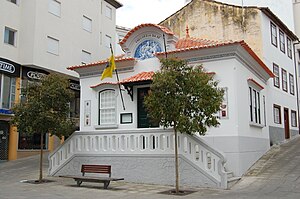Junta de freguesia: Difference between revisions
Appearance
Content deleted Content added
No edit summary |
No edit summary |
||
| (13 intermediate revisions by 11 users not shown) | |||
| Line 1: | Line 1: | ||
[[File:Bragança70.jpg|thumb|right|300px|Building of the |
[[File:Bragança70.jpg|thumb|right|300px|Building of the {{Lang|pt|Junta de Freguesia}} of [[Sé (Bragança)|Sé]], [[Bragança Municipality]].]] |
||
The '''''junta de freguesia''''' ([[ |
The '''''junta de freguesia''''' ([[Portuguese language|Portuguese]] for "parish board") is the [[Executive (government)|executive]] body of a ''[[freguesia (Portugal)|freguesia]]'' (civil parish), a subdivision of each [[Municipalities of Portugal|municipality]] of [[Portugal]]. Each ''freguesia'' also has a [[legislature]], this being the ''[[assembleia de freguesia]]'' (parish assembly). |
||
| ⚫ | The laws regulating the ''juntas de freguesia'' are |
||
Each ''junta'' includes a President and several other board members, elected by the ''assembleia de freguesia'' from their own members, with the President being always the first of the most voted list in the local elections.<ref>{{cite web|url= http://www.anafre.pt/informacoes-gerais/ficheiros/Freguesia_Orgaos.pdf|title= FREGUESIA - ÓRGÃOS|author= [[Associação Nacional de Freguesias]]|access-date= 31 January 2014|work= anafre.pt|language= Portuguese|url-status= dead|archive-url= https://web.archive.org/web/20140201200637/http://www.anafre.pt/informacoes-gerais/ficheiros/Freguesia_Orgaos.pdf|archive-date= 1 February 2014}}</ref> |
|||
| ⚫ | The laws regulating the ''juntas de freguesia'' are Law 169/99, of 18 September 1999 and Law 5-A/2002 of 11 January 2002.<ref>{{cite web |url= http://dre.pt/pdf1sdip/2002/01/009A01/00020032.PDF|title= Lei n.o 5-A/2002 de 11 de Janeiro|author= [[Assembly of the Republic (Portugal)|Assembly of the Republic]]|date= 28 January 2013|access-date= 31 January 2014|work= [[Diário da República]]|language= Portuguese}}</ref> |
||
A ''junta de freguesia'' is a level lower than the ''[[câmara municipal]]''. |
|||
==See also== |
==See also== |
||
| Line 12: | Line 17: | ||
[[Category:Local government in Portugal]] |
[[Category:Local government in Portugal]] |
||
{{Portugal-poli-stub}} |
{{Portugal-poli-stub}} |
||
Latest revision as of 13:23, 20 November 2023

The junta de freguesia (Portuguese for "parish board") is the executive body of a freguesia (civil parish), a subdivision of each municipality of Portugal. Each freguesia also has a legislature, this being the assembleia de freguesia (parish assembly).
Each junta includes a President and several other board members, elected by the assembleia de freguesia from their own members, with the President being always the first of the most voted list in the local elections.[1]
The laws regulating the juntas de freguesia are Law 169/99, of 18 September 1999 and Law 5-A/2002 of 11 January 2002.[2]
A junta de freguesia is a level lower than the câmara municipal.
See also
[edit]References
[edit]- ^ Associação Nacional de Freguesias. "FREGUESIA - ÓRGÃOS" (PDF). anafre.pt (in Portuguese). Archived from the original (PDF) on 1 February 2014. Retrieved 31 January 2014.
- ^ Assembly of the Republic (28 January 2013). "Lei n.o 5-A/2002 de 11 de Janeiro" (PDF). Diário da República (in Portuguese). Retrieved 31 January 2014.
